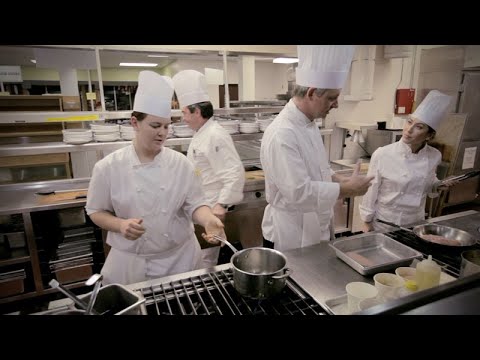Career Overview
Preparing, cooking, as well as presenting meals and specialty foods is a big part of this job. Cooks may also oversee staff, plan menus or manage kitchen activities. They may work under the direction of dietitians or chefs. Cooks work in a wide range of establishments that serve food, from restaurants to hospitals to food trucks. Cooks need to know about safety, sanitation and food storage regulations, as well as other best practices.
Cooks should be organized, able to work under pressure and enjoy working with their hands. It is important to have good communication skills since cooks often work with other kitchen and wait staff.
Apprentice cooks are included in this career.
Job Titles
Duties
In general, cooks:
- Prepare and cook meals and individual dishes, including ethnic cuisine or specialty dishes
- Clean kitchen and work area
- Set up and oversee buffets
- Plan menus, determine size of food portions, estimate food requirements and costs, and monitor and order supplies
- Maintain inventory and records of food, supplies and equipment
In addition, cooks may:
- Prepare and cook special meals for patients as instructed by a dietitian
- Oversee kitchen operations
- Schedule and supervise kitchen staff
- Hire, train and fire kitchen staff
Earnings
Earnings is income that workers receive in exchange for their labour. Depending on the type of employment, earnings can be in the form of wages (hourly), salaries (fixed monthly or annual) or self-employed earnings.
Work Environment
# Workers Employed
22,325% Employed Full Time
27%Cooks work full-time, part-time, on contract or on call. The hours may include early mornings, late evenings, weekends and holidays. The work may also be seasonal, especially at resorts.
Cooks work in a wide range of establishments that serve food including restaurants, cafes, diners, hotels, resorts, hospitals, schools and other educational facilities. They may also work on cruise ships, for catering companies or in food trucks. Many large restaurants and institutional kitchens have modern equipment, convenient work areas and air conditioning. Older, smaller establishments may have less comfortable work settings. Kitchens must be clean, well ventilated, appropriately lit and properly equipped with sprinkler systems to protect against fires.
Sometimes, cooks must work in small places and may be surrounded by other kitchen staff during busy periods. They must be able to lift heavy objects, work near hot ovens and grills, and stand for long periods of time.
Cooks usually work under time pressure and must make sure they follow quality, safety and sanitation guidelines. Safety is key for cooks because there are many risks in the kitchen, including slipping, falling, cuts and burns.
Career Pathways
There are many ways for cooks to take on more senior roles. With experience and training, a cook can move to a supervisory or more senior position, such as chef. Some cooks may also choose to open their own restaurant or food truck.
Occupational Interests
It’s important to understand what kinds of occupations align with your interests.
For more about occupational interests visit Skills for the Future Workforce > Characteristics.
Here are the top occupational interest(s) for this career profile:
Education, Training and Skills
Education, training and qualifications vary depending on the employer. Completion of secondary school may be required. Other training may include a cooking, culinary arts or related program, although on-the-job training may also be provided.
Trade certification for cooks is available through SkilledTradesBC but is not mandatory for employment. Certification is not required to work as a cook in B.C. Those who wish to be certified must complete a three-year apprenticeship program.
Apprenticeship programs
Work experience and in-class instruction are part of apprenticeship programs. Some part-time and online programs may be available. To apprentice, workers must be sponsored by an employer. A person who successfully completes an apprenticeship program and the final certification exam earns a Certificate of Qualification. Workers with significant experience in the trade may be able to challenge the certification exam to earn the Certificate of Qualification without completing a formal apprenticeship. For more information on earning a Certificate of Qualification, visit SkilledTradesBC.
To work in other provinces
Cooks may need Red Seal certification to work in other provinces. This can be earned by passing an exam and proving significant work experience.
Workers coming to B.C.
Cooks who are certified by a regulator elsewhere in Canada can apply for the same certification from the regulator in B.C. Under the terms of the Canadian Free Trade Agreement (CFTA), most applicants who are transferring their credentials from elsewhere in Canada will not be required to complete additional training or testing. However, the B.C. regulator may ask applicants to provide further information, such as a letter of good standing, references or a criminal record check.
Workers who trained outside of Canada
Cooks who trained outside of Canada and have never received certification from a Canadian jurisdiction will likely need a full assessment. Most occupational regulators have a process for assessment and recognize internationally trained applicants. Contact SkilledTradesBC for details on how to apply for certification in B.C.
For information about labour mobility in Canada, visit workersmobility.ca.
View a list of Professional Regulatory Authorities in B.C.
Education programs in B.C.

Top Skills
Every job calls for a certain set of skills. Knowing those skills is the first step in finding a good career fit.
Here, you will find the 10 most relevant workplace skills. Some are more important to achieving success in a certain career than others. These skills may come naturally to you or you may need to gain them through education, training and experience.
See the list of work-related skills below, ranked in order of importance for this career. Check out the list and see if this career matches your skills—take that first step!
Giving full attention to what other people are saying, taking time to understand the points being made, asking questions as appropriate, and not interrupting at inappropriate times.
Using logic and reasoning to identify the strengths and weaknesses of alternative solutions, conclusions or approaches to problems.
Keeping track of and assessing your performance, other individuals, or organizations to make improvements or take corrective action.
Talking to others to share information effectively.
Managing one’s own time and the time of others.
Adjusting actions in relation to others' actions.
Understanding written sentences and paragraphs in work-related documents.
Being aware of others’ reactions and understanding why they react as they do.
Actively looking for ways to help people.
Considering the relative costs and benefits of potential actions to choose the most appropriate one.
Labour Market Statistics
Discover data, facts and information that have been gathered and analyzed. Learn about the characteristics of the economy and labour market in B.C.
Employment
Find out about employment types and trends by region and industry.
Employment
22,325Employment by Region







| Region | Employment | % Employment of this Occupation |
|---|---|---|
| Cariboo | 625 | 2.8% |
| Kootenay | 845 | 3.8% |
| Mainland/Southwest | 12,770 | 57.2% |
| North Coast and Nechako | 415 | 1.9% |
| Northeast | 320 | 1.4% |
| Thompson-Okanagan | 2,980 | 13.4% |
| Vancouver Island/Coast | 4,365 | 19.6% |
Labour Market Outlook
The B.C. Labour Market Outlook is a 10-year forecast of the expected supply and demand for labour in the province. It’s usually updated every year. The purpose is to provide British Columbians with the knowledge to make informed decisions on careers, skills training, education and hiring.
Forecasted Job Openings (2025-2035)
7,770Forecasted Job Openings
Forecasted Employment Growth Rate
Composition of Job Openings
Job Openings by Region (2025-2035)







| Region | Job Openings | Avg. Annual Employment Growth |
|---|---|---|
| Cariboo | 190 | 1.0% |
| Kootenay | 250 | 0.4% |
| Mainland/Southwest | 4,930 | 1.1% |
| North Coast and Nechako | 110 | 1.0% |
| Northeast | 60 | 0.2% |
| Thompson-Okanagan | 880 | 0.8% |
| Vancouver Island/Coast | 1,350 | 0.7% |
Industry Highlights
Learn about the opportunities in B.C.'s major industries, including employment trends, earning potential, locations of work and more.
Forecasted Job Openings by Industry
| Industry | Job Openings (2025-2035) |
|---|---|
| Accommodation and Food Services | 6,000 |
| Health Care and Social Assistance | 980 |
| Retail Trade | 200 |
| Information, Culture and Recreation | 180 |
| Manufacturing | 70 |
Insights from Industry
The job of a cook has changed over the last 10 years. A cook can be a worker who makes simple meals or someone who runs a food truck offering specialty cuisine. Cooks who keep up with new food trends and consumer demand often have more employment opportunities. Food trucks have recently become popular and some cooks prefer to run a food truck than work in a more traditional restaurant.
It’s important to build good relationships with other cooks, kitchen workers and suppliers. A supportive industry where cooks and other kitchen professionals help each other is the key to success for the cook and the restaurant.
Cooks can be trained by going to culinary school or they can be trained on-the-job. There are opportunities to gain experience and learn cooking skills by working in different cities and in a variety of kitchens.
Some cooks use social media to become known. They use popular social media networks, such as Instagram, to share new dishes and skills. By growing a social media community and fan base, some cooks open their careers to write food-focused articles or books, or appear on cooking shows.
Resources
-
British Columbia Restaurant and Foodservices Association (BCRFA)www.bcrfa.com
-
Canadian Culinary Federationwww.culinaryfederation.ca/en
-
Go2HRwww.go2hr.ca
-
Go2HR Job Boardwww.go2hr.ca/jobs
-
Red Seal Programwww.red-seal.ca/eng/welcome.shtml
-
Restaurants Canadawww.restaurantscanada.org
-
SkilledTradesBCskilledtradesbc.ca/








